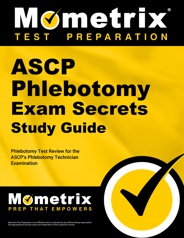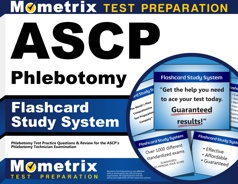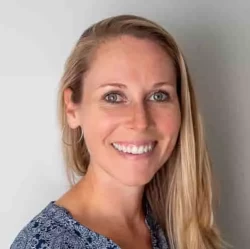The American Society for Clinical Pathology (ASCP) administers the Phlebotomy Technician exam for those pursuing PBT(ASCP) certification as a phlebotomy technician in the United States.
Click “Start Test” above to take a free Phlebotomy Technician practice test!
ASCP Phlebotomy Technician Exam Eligibility
ASCP offers seven routes of eligibility for this exam.
Route 1
You must have a high school diploma or some equivalent, and you must have successfully completed a MAACLS-approved phlebotomy program within the last five years.
Route 2
You must have a high school diploma or some equivalent, and you must have successfully completed a two-part structured phlebotomy program within the last five years. Within this program, you must have accumulated 40 hours of classroom training and 100 hours of clinical training.
Route 3
You must have a high school diploma or some equivalent, and you must have successfully completed at least one year of full-time clinical experience as a phlebotomy technician within the last five years.
Route 4
You must have a high school diploma or some equivalent, and you must have successfully completed RN, LPN, or other allied health professional education. You must also have performed at least 100 successful and unaided blood collections within the last five years.
Route 5
You must hold a valid MLS(ASCP) or MLT(ASCP) certification.
Route 6
You must hold a valid DPT(ASCP) certification, and you must have performed at least 100 successful and unaided non-donor blood collections within the last five years.
Route 7
You must have a high school diploma or some equivalent, and you must have successfully completed a CDPH-approved phlebotomy program within the last five years.
ASCP Phlebotomy Technician Exam Outline
The Phlebotomy Technician exam contains 80 multiple-choice questions and has a time limit of 2 hours.
The questions on the exam are theoretical, procedural, or some mixture of the two. The theoretical questions are used to assess your knowledge, while procedural questions are used to assess your skillset and technique.
The exam is split into six content areas:
I. Circulatory System (5%-10%)
- Structure and function of the circulatory system
- Composition and function of blood
- Terminology
II. Specimen Collection (45%-50%)
- Review and clarification of orders
- Patient communication, identification, assessment, and preparation
- Site selection
- Common tests
- Order of draw
- Considerations and complications
- Equipment and terminology
III. Specimen Handling, Transport, and Processing (15%-20%)
- Specimen types and suitability
- Accessioning
- Labeling
- Assess specimen quality
- Transportation and storage
- Equipment and terminology
IV. Waived and Point-of-care Testing (5%-10%)
- Urinalysis
- Hemoglobin
- Hematocrit
- Coagulation
- Glucose
- Kit tests
- Performance
- Operations
- Terminology
V. Non-blood Specimens (5%-10%)
- Physiology
- Patient preparation and collection
- Processing
- Handling
- Terminology
VI. Laboratory Operations (15%-20%)
- Quality control and improvement
- Interpersonal relations
- Professional ethics
- Regulatory applications
- Terminology
Check Out Mometrix's ASCP Phlebotomy Study Guide
Get practice questions, video tutorials, and detailed study lessons
Get Your Study Guide
ASCP Phlebotomy Technician Exam Registration
To register for the Phlebotomy Technician exam, you should first clearly determine which route of eligibility you wish to take and ensure that you have all of the necessary documentation. You must then submit an online application, which includes your documentation, personal information, and a $145 application fee.
Once your application has been submitted, it will be reviewed by ASCP within 60 days. You will receive an email when your applications status is ready to be reviewed, which you can do by logging in to your ASCP account. If your application was approved, you will be provided with instructions on how to schedule your exam.
Test Day
You should arrive at the test venue 15-30 minutes prior to your scheduled exam time. During check-in, Pearson VUE will collect your signature and photo and will ask for a valid for of government-issued photo ID. They will also use biometric technology to capture a palm-vein image, which ensures that each examinee only has a single record in the system to safeguard the integrity of the exam.
You will be asked to leave your personal belongings in a small locker outside the testing room, including your smartphone, smartwatch, or other such items. You are allowed to bring a non-programmable calculator.
How the ASCP Phlebotomy Technician Exam is Scored
The Phlebotomy Technician exam is computer-adaptive, so depending on your performance, the difficulty of your test will increase or decrease as you go on.
Here’s a look at how it works:
The questions on the PBT exam are rated on a scale of 100-999. The higher a question is rated, the harder the question is (e.g., a question marked as 670 will be more difficult than a question marked 544).
To pass the exam, your final question must be on or above the 400 mark. If your final question is below this mark, you will not pass the exam, even if you have answered some questions above the 400 mark at some point during the exam. This is because the computer has rated the difficulty of your final question based on how you answered the previous questions.
Phlebotomy Online Prep Course
If you want to be fully prepared, Mometrix offers an online Phlebotomy prep course designed to give you everything you need to succeed!
Here’s what you’ll find in the Phlebotomy course:
- 30 Review Lessons Covering Every Topic
- 600 Phlebotomy Practice Questions
- 300+ Digital Flashcards
- Money-back Guarantee
- Mobile Access
Everyone learns differently, so we’ve tailored the online prep course to ensure every learner has what they need to prepare for the Phlebotomy exam.
Click below to check it out!
Receiving Your Scores
You should receive a notification email within 4-7 business days stating that your scores are ready to view. You must then log in to your ASCP account to view if you have passed or failed the exam.
If you completed a NAACLS-, ABHES-, or CAAHEP-accredited program, your score will also be released to the officials of your program unless you provide written consent stating otherwise to the ASCP Board of Certification.
Check Out Mometrix's ASCP Phlebotomy Study Guide
Get complex subjects broken down into easily understandable concepts
Get Your Flashcards
FAQs
Q
How many questions are on the ASCP Phlebotomy Technician exam?
A
There are 80 multiple-choice questions on the exam.
Q
How long is the ASCP Phlebotomy Technician exam?
A
The time limit for this exam is 2 hours.
Q
What is the passing score for the ASCP Phlebotomy Technician exam?
A
To pass the exam, you must achieve a scaled score of at least 400.
Q
How much does the ASCP Phlebotomy Technician exam cost?
A
The application fee for the exam is $145.




